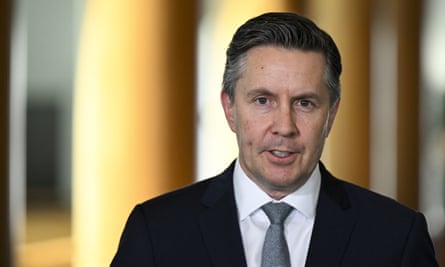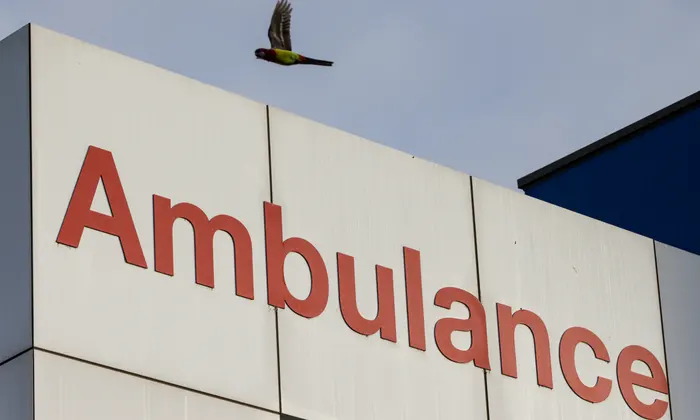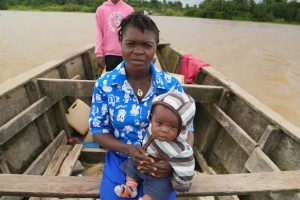Covid hospitalisations have increased by 11% in the past week, the federal health minister Mark Butler said, as he announced new vaccines have been approved to boost supply.
However, a fifth vaccine dose has not been recommended by the Australian Technical Advisory Group of Immunisation [Atagi] for the general population at this time, Butler said. However, he said this may change next year ahead of winter, particularly if other variants emerge.

Butler said the Omicron subvariant XBB, now present in Australia, led to a “short and small” wave of infections in Singapore, with severe disease and death very rare for people who had at least two vaccine doses.
This was part of the evidence that led to Atagi’s decision not to recommend a fifth vaccine dose, he said.
Atagi has recommended an Omicron-targeting vaccine from Pfizer be added to the booster doses available, and it will be available for people aged 18 and over from 12 December. Meanwhile the paediatric vaccine from Pfizer for children aged six months to five years will be available in limited circumstances for vulnerable children.
A Moderna paediatric vaccine is already available, as is an Omicron bivalent vaccine from Moderna.
The chief health officer Prof. Paul Kelly said it was vulnerable people who must be prepared by accessing antivirals as soon as they tested positive, and ensuring they had received third and fourth vaccine doses.
“I can absolutely assure everyone that we do have plenty of supply of antivirals,” he said. “A person over 70 who has had three or four doses of vaccine, can half their risk of death by taking the tablets.”
He said the current Covid wave “has been going up for the last few weeks … it should peak soon and drop quickly.” In the meantime, he urged immunocompromised and other vulnerable people in particular to consider wearing masks.
But “confused rules” around mask-wearing and social distancing in hospitals pose a major health risk, the president of the Australian Medical Association, Prof Steve Robson, said. He said rules on masks in hospitals and other health settings have “become a bit hard to interpret”, calling for state and territory health departments to step up.
“A lot of hospitals have relaxed or removed mask requirements, and that’s a concern,” he said.
“Because that puts visitors and also patients and staff at risk. You need staff to run a hospital. So if we have increased rates of staff being infected, either in the community or worse still, in the workplace, that degrades the hospital’s capacity to provide care quickly.”
Robson said he is also concerned about waning immunity given “there’s been a huge stall in third and fourth vaccination rates around the country”.
“And we’ve got new variants arriving that seem to evade immunity. We’ve got a situation where the overall population is at risk of Covid infection, and we’ve also just got a huge backlog of work that hospitals were unable to do during the mid-year and earlier waves, and a lot of staff who have not had any capacity to take leave for a while.
“We think all these things together pose a very major risk over the holiday season when people will be on holidays and there will also be huge amounts of travel.”

Personal protection equipment has been deployed to aged care homes, and a surge workforce was prepared to step in if required, Butler told Guardian Australia earlier on Tuesday.
“The government has been on the front foot to help protect older Australians most at risk of Covid,” he said.
“This includes supporting the aged care sector by continuing to prioritise booster vaccinations [and] ensuring access to lifesaving oral anti-viral treatments. They’re safe, they’re effective and they’re available for everyone aged over 70 and other high-risk groups.”
He said the government continues to fund coronavirus support grants to help providers with the costs of outbreaks, and to provide financial support for casual workers to not attend work if they are Covid-positive.
But the aged care director for the United Workers Union, Carolyn Smith, said tackling year after year of Covid had taken a toll on aged care staff, who were still not being properly paid. Burnout and fatigue are ongoing concerns, she said.
“The toll taken by Covid on aged care residents earlier this year was devastating, and continues to be a deadly threat in many aged care providers,” she said.
“Aged care workers carry the emotional burden of a higher number of deaths of residents, while facing continuous understaffing and low pay that contribute to a workforce exodus.
“The whole aged care system has been on the verge of collapse this year, and a fresh round of Covid will continue to place enormous pressure on aged care workers.”
She welcomed the federal government’s commitment to mandated care-time reforms but said many aged care workers who worked through the pandemic, covering lifestyle, catering, cleaning and laundry, were yet to see any pay rise out of the work value case.
“So these workers get a renewed Covid surge, so far no pay rise, understaffing at ridiculous levels – it’s been a tough year for them,” she said.
Omicron subvariants BQ.1 and XBB are driving significant cases and hospitalisations overseas due to their ability to escape immunity from past infection – and as immunity wanes from past vaccination.
But Butler said in Australia, a “soup” of variants is driving new cases.
“This increase in cases is complicated,” he said. “It is not being driven by any one strain.”
In the meantime, people are being asked to stay home when sick and to keep up-to-date with their vaccinations.
Source:https://www.theguardian.com/




















Add Comment